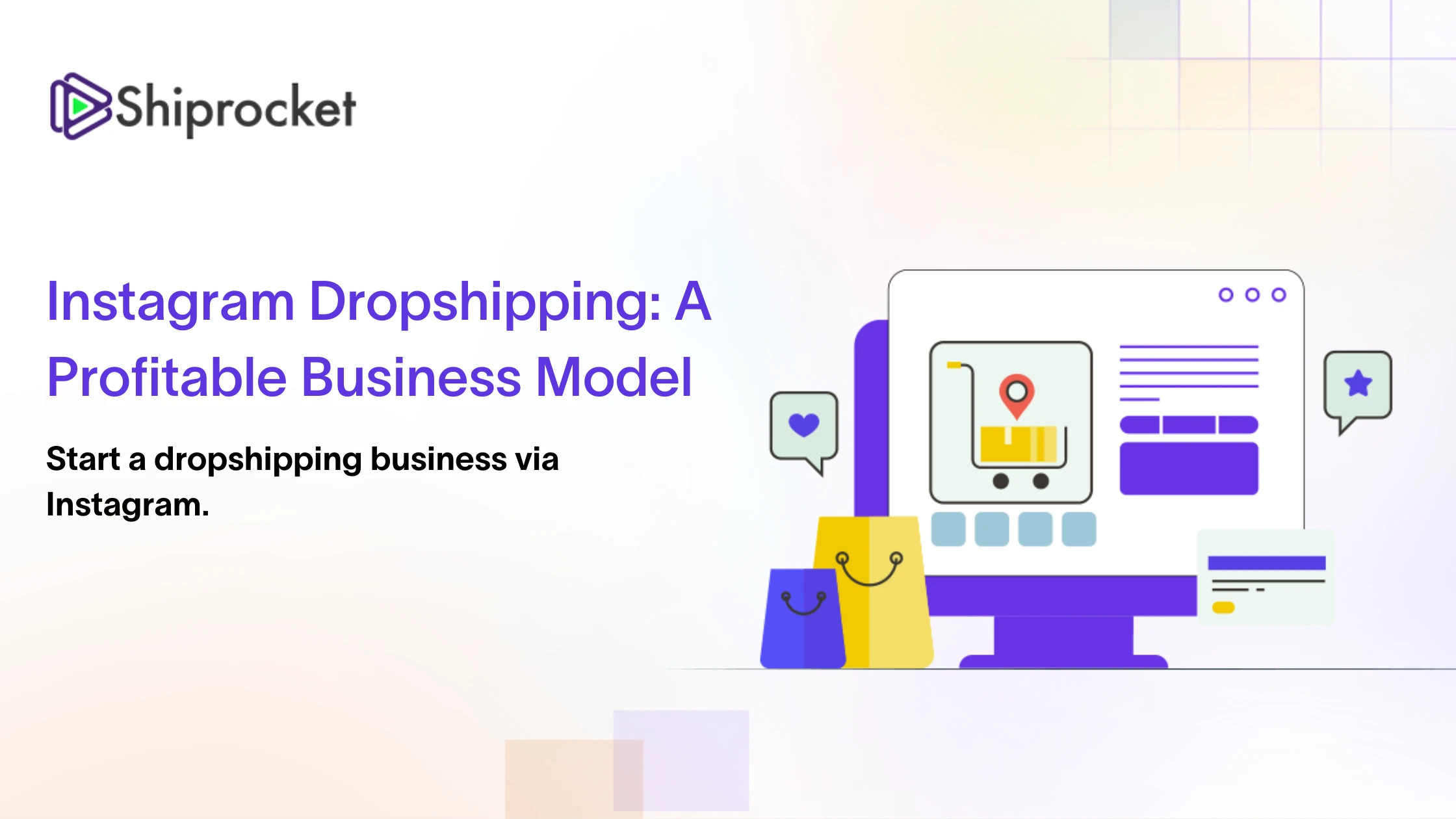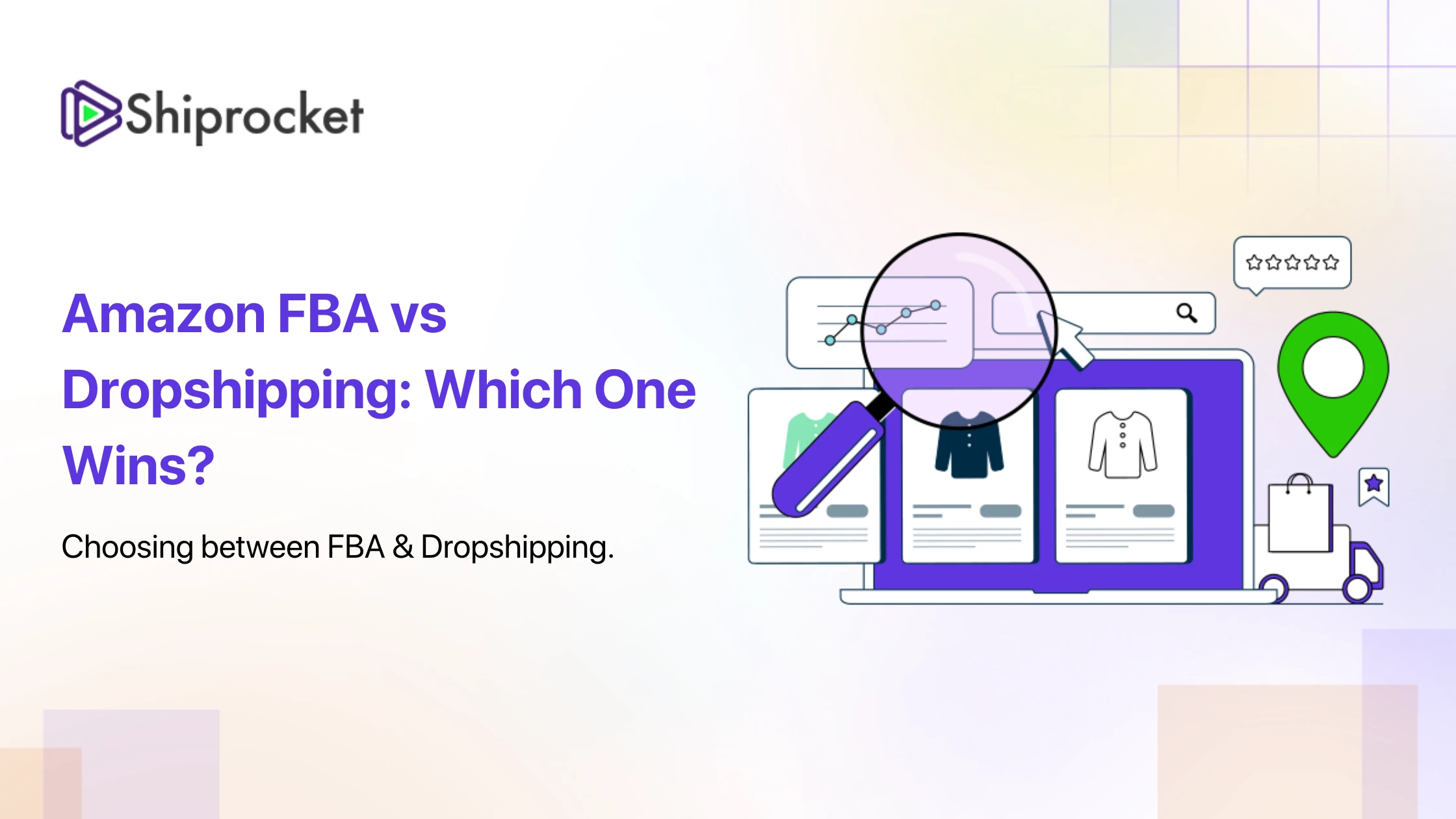Best Marketplaces In India To Sell Your Products Online [2025]
The eCommerce market is multiplying, and many people have started buying products online post-pandemic. So now, more and more sellers are setting up their stores online and trying to be omnipresent for their customers.
This might sound extremely simple and easy. However, it isn’t! The online marketplaces in India offer businesses multiple opportunities that brick-and-mortar stores can’t.

Building Your Online Store on Marketplaces
The online market is a whole lot more than just selling things. It is about creating a unique experience and space that is tailored just for you and your creations. It is simply to showcase your designs governed by your rules and no one else in between to take a chunk out of your gains.
Beginning a business and creating an online store are simple endeavours. In addition to building your own online store, you can also sell your products across different sales channels. These include mobile apps, external eCommerce marketplaces, physical point-of-sale (POS) systems, and even social media platforms. Starting your online store can be rewarding if done correctly. One of the drawbacks of creating a website is that you may have to use marketing strategies aggressively to attract customers to your business. Another drawback is that creating your online store may require an upfront investment and a lot of time to create a stable brand.
When you begin your own online store, you will not be obliged to pay a fee for every sale and will not be required to abide by the rules of external parties.
Benefits of Your Own Online Store
The pros of creating your online store include the following:
- Brand control and customisation: One of the biggest benefits of owning an online store is that you get full control over your brand presentation. You can design your online store from scratch, right from picking the brand colours to designing its look and feel. You can also tailor your online store to match your brand’s vision and appeal directly to your target audience. Having an online store also gives you the flexibility to run and manage it from anywhere. You’ll just need an internet connection.
- Market reach and global expansion: An online store helps expand your geographical boundaries. It allows you to reach customers across the globe. This expanded market reach helps you widen your customer reach and increase sales and profits. What’s the best part? Your online store offers opportunities to explore new market niches without requiring a significant upfront investment. You don’t have to own a retail space or even physical inventory.
- Lower operational costs: Running an online store is comparatively less expensive as compared to operating a physical store. You save money on rent, utilities, staffing, etc. Did you know online stores make more profits as compared to physical stores? Online stores can make as much as 4.5% profits, while physical stores only make 0.5% profit.
- Data-driven decisions: Having your online store gives you direct access to extensive customer data, including their behavioural patterns, purchase history, etc. With access to customer data, you can personalise their shopping experience. You can make 60% of your customers come back for repeat purchases with a personalised shopping experience. Recommending products and sending targeted offers can also help you improve customer satisfaction. Data and insights into your customers’ behaviour can help you optimise your marketing strategies and improve overall business operations.
- Accessibility and convenience: Unlike most physical stores, your online store can remain operational 24/7. This allows your customers to make purchases anytime, at their convenience, significantly increasing sales opportunities.
- Cost-effective marketing and advertising: You can implement a variety of cost-effective marketing strategies to increase brand awareness. SEO, email marketing, and social media marketing are the most common forms of marketing for eCommerce stores.
Why Are Marketplaces An Ideal Option?
Creating a fancy website with vibrant images isn’t enough to take customers swiftly through the sales funnel. You can easily reach a global customer base, but you need to be perceptible to them. One of the easiest and most effective ways of doing this is by enrolling your business in the top online marketplaces. Listing your products there will undoubtedly give you greater visibility and probability of acquiring prospective customers.
Logistics involves the building of a robust supply chain. Furthermore, there are other obstacles, such as shipping and payments, which these marketplaces take care of. Courier companies (like FedEx, UPS, and more) face the problems of infrastructure and warehousing. Also, payment gateways are accessible, but most Indians prefer ‘Cash on Delivery. This method attracts multiple courier charges, which need to be borne by the sellers.
Hence, these marketplaces are an ideal option. They integrate with 3PL logistics providers such as Shiprocket to reduce the costs of both sellers and buyers.
There are numerous online selling sites and marketplaces in India that sellers can utilise for greater brand awareness and revenue generation. Here are some of the top marketplaces in India:
Best Online Selling Marketplaces/Platforms in India

Let’s take a look at some of the most popular online selling platforms in India.
1. Amazon India
Amazon India is the most preferred marketplace in India. 76% of online shoppers consider it the most trusted online marketplace. Amazon has been a tough competition to eCommerce biggies like Flipkart & Myntra.
It provides shipping options with multiple gateways like Amazon Prime, Amazon Self-Ship, and more. The technological innovations and outstanding customer service have made it a preferable choice.
Amazon offers many features for sellers, including the following:
- Amazon Seller App: It helps manage business activities on a mobile device, such as tracking and fulfilling orders, managing pricing, and responding to customer messages.
- Amazon Seller Central: It is an online dashboard that helps manage and list products on the Amazon marketplace, including adding products, managing inventory, advertising, and opening support cases.
- Fulfillment by Amazon (FBA): It is a service that allows Amazon sellers to store their products in Amazon Fulfillment Centers, where Amazon handles packing, shipping, and delivery.
- Transparent pricing: Amazon displays its fee structure publicly on all fee-related pages on its website.
- Secure payments: Funds are deposited in your bank account every 7 days, including for Pay on Delivery orders.
Other features of Amazon for sellers include:
- Managing inventory
- Tracking sales and payments in real-time
- Accessing Seller Programmes
- Keeping track of customer feedback
- Analysing your business performance
To create an Amazon Seller Central account, you need to meet the following requirements:
- Have a valid business or individual identity
- Provide accurate contact information
- Provide a valid bank account number.
2. Flipkart
Initially, Flipkart started by selling books online. Now, it sells a wide range of products.
Flipkart provides logistics services called Ekart to its sellers, along with a fulfillment center. The platform allows its sellers to reach billions of customers instantly. Flipkart’s USPs are quick payments (7 to 15 days) and timely pick-up service.
Flipkart is the biggest competitor for Amazon in India. It is also a preferred choice for sellers due to its extensive support. It offers services like professional account management, assistance with product photoshoots, and even help with cataloguing. Another reason for you to start your online store on Flipkart is that it offers flexibility in making payments with options like Flipkart pay later and cardless credit.
3. Myntra
It is a marketplace with a large variety of fashion accessories, beauty care products, clothes for men and women, footwear and more. The marketplace was opened in 2007 with a focus on personalising gift items. Sellers must register themselves first, and once their profile is reviewed, they can sell their products on the website.
Myntra offers sellers a variety of features, including:
- Control over merchandise: Sellers have complete control over their merchandise, including cataloguing, quality, and handling orders.
- Support: Myntra has a dedicated team that helps with cataloguing, fulfillment, and supply chain management.
- Payment: Myntra processes payments through its partners, making transactions quick and secure.
- Analytics: Myntra provides advanced analytics tools that help sellers track sales performance, identify trends, and make business decisions.
- Marketing and promotional tools: Myntra helps sellers reach customers and boost sales through marketing and social media promotion.
- Logistics support: Myntra provides support with warehousing, packaging, and shipping.
- Commissions: Myntra charges a commission of 4% to 5% from sales, depending on the product category, with lower charges for high-value and low-priced products.
- Inventory management and fulfillment solutions: Myntra offers four solutions, including Myntra Omni, which allows sellers to fulfill orders from multiple locations, and Myntra FBM, which allows sellers to bulk ship to Myntra.
- User-friendly interface: Myntra helps sellers market and sell their products effectively.
4. Snapdeal
Snapdeal is another online marketplace that originated in India. Here, you can sell products as small as a hair clip to furniture, and you can create your target audience once you set up your online store.
It’s effortless to sell on Snapdeal; you must register your business on the platform and list your products. You can manage your orders received via their portal, and they also offer shipping services at additional costs.
Here are some key features of Snapdeal for sellers:
- Free registration: There’s no registration fee, and you can start selling right away.
- Wider reach: Snapdeal has a wider market reach than other platforms.
- Pre-loaded features: Snapdeal has several features to help sellers run their business, like the ‘scan and sell’.
- Automated features: The platform’s automated features give sellers more time and resources to develop products.
- Faster delivery: Snapdeal offers faster delivery than other shopping sites.
- Payment: Snapdeal transfers money to your bank account once the buyer accepts your product.
- Payment cycles: There are four payment cycles for sellers in a month.
- Snapdeal capital assist programme: You can use this programme to finance your purchases and business.
5. IndiaMart
IndiaMart is one of the leading marketplaces in India, with over 10 crores of registered users. They have almost 60% of India’s market share in selling products online.
You can sell anything from medical equipment to clothes to fabric and whatnot. Not only this, but it is also a great platform to resell items.
On IndiaMart, you’re required to create your seller profile which is then verified, and once you are through with the verification process, you can list your products online. The best part is that they don’t charge any commission or transaction fees on each product you sell.
6. eBay
Around 2.1 million shoppers annually shop through eBay, and over 30,000 merchants are selling on it. A majority of customers on eBay use it to look for secondhand products.
To sell on eBay, you need to sign up and create a business account on the platform. Once verified, you can list your products in the form they provide. However, what sets eBay apart from other online selling platforms is its auction pricing system. After registering for a ‘personal’ or ‘business’ account to get started on eBay, you can set a starting price for potential buyers. It will enable them to bid on until they reach an offer they like. This is an excellent feature for those looking to quickly make some extra income.
Also, your first 200 listings are free, and they start charging you a $0.35 insertion fee per listing. They also charge 10-15% of the final value once your item sells through their marketplace.
7. Facebook Marketplace
Facebook Marketplace has over 2.7 billion monthly users, offering a significant opportunity to sell your products online. According to recent statistics, the marketplace has over 1.79 million active users. The growing popularity of Facebook Marketplace can be attributed to the several benefits it offers. The benefits of selling on Facebook Marketplace include the following:
- Mobile-friendly
- Personalisation
- Brand exposure
- Easy and direct communication
- Allows testing of new products
- Identify customer preferences
- Easy to integrate with other social networks
- Targeted ads algorithm
Anyone above the age of 18 years can shop from Facebook Marketplace, making it highly accessible to a lot of people. Also, you can almost sell anything and everything here as it doesn’t have strict business guidelines. Facebook does not charge any fees for listing products on the marketplace. Although they previously charged 5% per shipment.
8. Etsy
Etsy is another online site and marketplace where you can set up your business and list your products. It is one of the most popular marketplaces globally, and slowly, it is also making its way through the Indian market. Etsy is majorly popular for DIY, art and craft products. Etsy is one of the best online selling platforms to sell your art and craft items. Moreover, it only allows crafting tools, handmade items, and vintage goods which are older than 20 years or more.
To get started on the platform, you need to list your business – which typically starts at a listing cost of ₹16; post which, you can list products for four months or until they sell. They also charge an additional 6.5% transaction fee on purchases made via their marketplace, including the postage price.
The best way to set yourself apart on Etsy is to specialise in a particular product category. Etsy offers some winning features to help your business succeed,which include the following:
- Discounted shipping fees
- Seller protection
- Advertising options
- Custom listing options
- Large community of active buyers
- Etsy store collections
- Search engine optimisation (SEO)
- Extensive customer and buyer support
However, Etsy also has competition and costs. To succeed, sellers must take use of the advertising opportunities available to them, comprehend and efficiently manage their fees, and deliver top-notch customer service.
9. Pepperfry
Pepperfry is the one-stop solution for household needs. Sellers can list products such as furniture, hardware, lamps, kitchen, dining, decor, and garden. Sellers can get their products listed for free in Pepperfry, but they have to pay a commission on every sale.
Here are some reasons why Pepperfry is one of the best online selling platforms:
- It hosts almost 1.2 crore potential customers each month
- You can enjoy the benefits of a network of over 200 Pepperfry stores
- You get access to Pepperfry’s extensive network of logistics deliveries to more than 18000+ PIN codes
- It also provides assembly services
- Pepperfry’s Category Managers also offers expert guidance on the latest market trends
- Leverage multiple shipment methods, including Pepperfry fulfilled, direct shipping, etc.
10. ShopClues
This online marketplace is a hub for over 6 Lakh merchants dealing in over 28 million products. The company serves all major pin codes in India. ShopClues is known for local and regional brands. It is best suited for sellers dealing in fashion, home & kitchen appliances, mobiles, electronics, and sports.
ShopClues offers many benefits to sellers, including the following:
- Payment: Sellers only pay when they sell, and ShopClues has regular and guaranteed payment cycles.
- Shipping: ShopClues takes care of shipping orders, including pickup, checkings, packaging, and shipment.
- Access to buyers: ShopClues gives sellers immediate access to millions of online buyers across India.
- Marketing expertise: ShopClues offers extensive marketing expertise.
- Support: ShopClues offers various tools and resources to assist sellers in setting up their online storefronts effectively.
How to Choose the Right Online Selling Platform?
As we have seen above, there are many online selling platforms. The features and benefits they offer can be overwhelming when choosing the right online selling platform to start an online business. Listed below are some points on which you should base your decision:
- Understanding your needs: Irrespective of being a solo artist or a budding enterprise, you will need to customise your choices to meet your demands. You can reflect on specific needs and support your likes.
- Keep a check on your costs: Understanding the pricing is crucial especially if you are a budding business. All platforms have their fee structure and knowing what you can afford and how your financial strategy is complemented is crucial.
- Compatibility with your offerings: Your products and your platform must be compatible. The marketplace should complement and showcase your goods and services well. Ensure the platform you choose is one that sells what your brand intends to.
- Understand your involvement: Understanding how involved you need to be in your management of the platform is also a crucial consideration. You must choose a platform that is conducive to expansion.
- Understanding your future needs: You must consider long-term business goals. It would help if you envision where you see your business in the near future.
Final Thoughts
If you are new to the eCommerce industry and don’t have a budget to invest in a website, then the online marketplace is an ideal option. Selling products in online marketplaces lets you reach customers all over the country. All you need is a registered company, a tax number, and a bank account. These platforms will take care of the rest of the logistics and payments (major obstacles for eCommerce businesses).
We hope this list will help you choose the best marketplace for your online eCommerce business.
A marketplace is a platform where multiple vendors can list their products and sell to their customers.
All marketplaces have a seller pannel where you can create an account and list your products and start selling seamlessly. The marketplace charges a small fee for listing.
Yes. You can create your Shiprocket account and ship your orders in one click.
Calculate Your Shipping Costs Now
X
X






Please get in touch
Hi Honey,
Kindly share your email address with us so we can get in touch with you as soon as possible. Meanwhile, you can explore the platform here to get started – http://bit.ly/2rqudQn
Thanks & regards,
Srishti Arora
Intreasted in Shiprock et services
I appreciate the real-life examples.